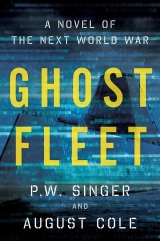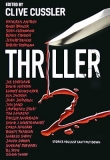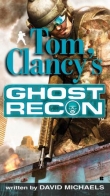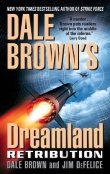
Текст книги "Ghost Fleet: A Novel of the Next World War"
Автор книги: P. Singer
Соавторы: August Cole
Жанр:
Триллеры
сообщить о нарушении
Текущая страница: 14 (всего у книги 37 страниц)
Pineapple Express Pizza, Honolulu, Hawaii Special Administrative Zone
The first thing Major Conan Doyle noticed was the smell. Warm mozzarella, the sweet tang of tomato sauce, and the pungent funk of fresh Hawaiian marijuana. Her mouth watered, and she clenched her stomach muscles to check the pain in her gut.
They entered through the alley off Ala Moana Boulevard and made their way down to the basement. By the time they reached the bottom step, the food aromas were gone.
“Smells like shit in here,” said Nicks.
“That the dope?” asked Finn.
“Nope,” said Conan. “More likely us.”
The restaurant’s owner, Skip, came down a few minutes later with a boar-sausage-and-pineapple pizza. “Can’t persuade you to have a broccoli with signature sauce?”
“The last thing my team needs is to get stoned,” said Conan. There were literally a hundred ways to mix marijuana into a pizza. Skip’s specialty was infusing it into butter and olive oil, which kept the pungent taste from ruining the tart flavor of a fresh tomato sauce.
“You uniforms are all alike, always stressed out, pills only. But you come back for the house special when the devils are gone,” said Skip. “Got any new footage?”
“Already left it at the dead drop,” she said. “You’ll have to wait till you get back Stateside to see it.”
“If that day ever comes.”
“It will,” she assured him and herself.
He handed her a blister pack of red-and-black polka-dot pills. “Ladybugs. For dessert.”
“Thanks, brother,” said Conan.
“I have to head back; I left Sharon up there,” said Skip, and he waved a quick goodbye.
As Skip went back upstairs, Conan nodded at Nicks and Finn. “You know what to do. I’ll stand guard at the door.”
She drew a stubby matte-black Mossberg riot shotgun, Honolulu Police issue, cracked open the storeroom door, and poked it through. With her other hand, she picked up a slice of pizza.
Nicks and Finn moved aside some drums of flour and pulled up the grate on the basement floor that covered the sewage feed. They wrestled with the pipe’s fitting and then dropped a yellow-striped tube ringed with tracks into the pipe. The Versatrax 300 had once been used by the Honolulu sanitation department for sewer-pipe inspections, but the block of nanoplex explosive duct-taped to it now gave the sewer-bot another capability. In military parlance, it was a VBIED, a vehicle-borne improvised explosive device.
Voices were raised upstairs. Quiet footsteps followed, and Conan pulled back into the room.
“Is it in?” hissed Conan. “Someone else is here. Quit dicking around.”
“Bot’s in, and inbound toward target,” said Nicks. She sat cross-legged and could have been meditating but for the viz glasses and control gloves she wore to guide the Versatrax through the sewer system.
A girl’s loud voice upstairs made them all wince. Skip’s daughter, yelling at some customer.
“Just got red light from the command detonator,” said Nicks. “Timer is set.”
“I don’t like it,” said Finn. “We should just hit ’em now. Take out a sector commander, at least.”
“No, they’ve got dignitaries coming in from Shanghai, Seoul, and Tokyo, remember? Hit the targets from off-island and we make sure the outside world knows we are still in the fight,” said Nicks.
“Whatever,” said Finn, pulling another slice of pizza from the plate. “Just get the little bot there first.”
“Roger that,” said Nicks, her hands still guiding the bot from afar, waving in the air as if she were playing patty-cake with an invisible child. “But first I need you to feed me a slice.”
“What am I, your parent? Feed yourself,” said Finn.
“I can’t. I take my hands off the controls and our little surprise goes up someone’s toilet,” said Nicks. “And I know I can’t trust an animal like you not to eat it all before we get done.”
They quieted at a girl’s scream. Skip’s daughter, but clearly scared this time. They looked to see what Conan’s orders were.
“Shit,” said Finn. “She’s gone upstairs.”
USS Zumwalt, Mare Island Naval Shipyard
Laughter echoed through the corridor. It had not been a good day aboard the Zumwalt, so Mike saw no reason for this kind of screwing around.
One of the fire-suppression bots had detonated its retardant payload in the wardroom during the 0200 meal. “It looks like a herd of elephants had an orgy in there,” a sailor had said, brushing past him.
Then there was the bigger problem this morning. The ship was supposed to be testing out the Navy’s new ODIS-E (Objective Data Integration System – Enhanced) program, a replacement for the prewar ATHENA, but from what he could see, all the system had done was blow out a power coupling.
The devastated look on his son’s face had said it all. If the ship’s captain couldn’t contain his disappointment, then this setback meant something ominous. What were they thinking, naming a ship’s control system after a story about a Greek guy lost at sea for ten years? Nobody knew their history anymore, and apparently nobody knew network engineering either. Mike’s bigger concern was the coupling. Spare parts were in short supply, and they couldn’t just order another one from the Chinese manufacturer.
In the corridor, Mike stepped out of sight and listened. He heard deep laughter, the kind that’s amplified by a thick gut. A woman’s voice, angry, followed:
“You should be apologizing for much more than that,” the woman shouted. “If you don’t attach this shielding here and here, then I’m going to be the least of your headaches.”
It was Dr. Li.
“You need to understand that nothing you know about gunpowder or cannonballs or whatever you did a long time ago is relevant now,” she said. “If you don’t shield the power cables, the energy they release, which is mostly —”
“Stop right there, lady,” said one of the crew. “We get it. That’s why we put some shielding there already. If you want it changed, you put it in the work-order system and we’ll get to it. Your job ain’t the only one that matters. Besides, who’s going to verify your, uh, work?”
“Verify my work? What’s that supposed to mean?” she asked.
“Yeah, well, to make sure it’s done right. That it can be trusted, you know. Or maybe you already got it checked out with Beijing?” More laughter. “This might not be good enough for you, but it’s the goddamn best America can do right now. Next rail shipment isn’t coming into Oakland until, oh, next week? So as of now, it’s good enough.”
Mike couldn’t place the voice. Whoever it was talked with a faint slur, as if he used a jawbone-implanted hearing device. Time to see who.
Mike stepped around the corner and cleared his throat.
“I’m hearing a lot of laughter today. Something funny?” he said. “Share it with me. Not much makes me laugh lately.”
“No worries, Chief,” said Parker, a petty officer second class in his thirties. “We got this handled; we’re just fixing some of the shielding on the ray gun.”
“Rail gun,” said Vern.
“Whatever you wanna call this Star Wars shit, lady,” said Parker.
Mike eyed the sailor. In his midthirties, Parker was clearly taking advantage of the Navy’s free hormone-enhancement therapy. His skin was drawn and dry, but his neck and biceps were frighteningly thick, like a bodybuilder who was five months pregnant. Mike shook his head in disappointment. The Mentor Crew was supposed to guide the new generation of wartime sailors but also to remediate new noncommissioned officers like Parker. The Stonefish strikes had cut down the ranks of the Navy’s enlisted leaders, and the wave of promotions to fill the gaps had elevated far too many men and women who were not up to snuff. Mike could see why Parker had topped out just below Mike’s own old rank. Becoming a chief petty officer required more than just time in service; you also had to be able to make it past a selection board of your peers.
“Her name is Dr. Li,” said Mike to Parker. “You will address your betters by their titles.” He turned to Vern.
“You getting what you need, Dr. Li?” Mike said, drawing out the Doctor.
“We need more shielding on the power cables before we can run the live-fire test,” said Vern.
Mike looked at her and then turned to Parker. He stepped up so he was chest to chest with the sailor, unfazed by the younger man’s bulk. As big as Parker was, he lacked Mike’s ability to intimidate.
“Well, Parker here, he’s concerned about America and her fleet,” said Mike, speaking to Vern but looking the sailor directly in the eye, daring him to disagree. “So seeing that you are a fellow American – hell, a civilian working her ass off to help arm said fleet – Parker just volunteered to weld it in for you, since working with metal seems to be something he’s got a passion for,” said Mike, a backhanded compliment for a sailor who spent too much time in the weight room.
Vern pinched the bridge of her nose with obvious exasperation. “You can’t use metal welding. It is an electromagnetic gun. Needs to be welded with plastic, otherwise the electromagnetic energy will… You want to be the guy who blew up the ship because he didn’t understand the future? Let’s leave it at that.”
“All right, all right,” said Mike. “Parker, you have one job now: Find me more shielding and install it like she wants it. Just make sure you understand what she’s talking about. If you have to strip apart your beloved weight room to get it, you will. If you have to use all the plastic chow trays in the shipyard, you will. Understood? If you need to bribe, screw, or steal to get what Dr. Li needs, you will.”
He turned to the others. “I know I don’t have to tell Parker here, but if anybody questions one of his fellow crew members’ patriotism again, I’ll grind you up and feed you to the seagulls myself. Now get back to it.”
Pineapple Express Pizza, Honolulu, Hawaii Special Administrative Zone
The Directorate marine was twice the size of the pizza-shop owner and he was not holding back. A desperate gasp followed each blow as Skip’s lungs emptied of air.
The translator on the marine’s belt was oblivious to the violence, stating the order in a digital monotone.
“Your daughter will come with us to a fancy party,” said the device.
Another marine held Sharon. He pinned her arms behind her back, forcing her to stick her chest out. Her head hung down, so her black hair veiled her face.
“She’s just fifteen,” said Skip, gasping for breath. “She stays here —”
Two more quick blows. The crack of Skip’s ribs made Sharon scream again.
“Shut it!” said the marine in English, tugging hard on her arms.
Conan ducked back into the stairwell.
A roundhouse kick from the giant marine sent Skip sliding through a cloud of flour and down behind the counter. With his brow covered in white powder, he looked up at Conan peeking through the stairway door.
Help, Skip mouthed. It looked like he couldn’t even get enough air in his lungs to speak.
Conan squeezed the riot gun’s pistol grip and ducked back out of sight.
A burst of Chinese among the marines followed.
Conan closed her eyes. There were four Directorate marines. She had eight rounds of ten-gauge street shot loaded. She could blow apart the restaurant in a matter of seconds.
Skip got up from his knees and charged the marines. The wet sound of his head hitting the hard yellow tile made Conan’s stomach turn.
Enough.
She raised the riot gun and flicked the safety off. She would have to get in close to make sure she didn’t cut down everyone in the restaurant with the gun’s wide arc of fire. She counted down.
Three. Two. One.
Exhale. Go.
And then she froze. This was not the mission. She clicked the safety back on.
Skip tried to get up from the floor but made it only to his hands and knees. He spat out a sticky crimson stream that mixed with the blood pooling from his split scalp. Then another kick landed with a thump on his temple.
Sharon wailed, “Don’t touch me!” Then muffled screams.
Conan dashed back down the stairs silently on bare feet.
“What the hell was going on up there?” asked Finn.
“You’re fine. I had you covered,” said Conan. “Just some customers getting rowdy. We gotta go out the back way, though.”
Finn put his hand on Conan’s arm. “What the hell is going on up there?” he asked again.
“I said let’s go. That’s an order,” snapped Conan.
Finn, Nicks, and Conan filed out the back of the restaurant into the alley and slunk out in the darkness, slowly working their way toward their extraction point, an eight-by-six-foot steel recycling bin a few blocks away. They climbed in and covered themselves in the wet and moldy cardboard and aluminum cans that would break up their bodies’ thermal signatures.
“Ten seconds to detonation,” whispered Finn, and he began to count it down.
“And contact,” he said.
Nothing.
“Well, at least the pizza was —” said Nicks.
An explosion detonated in the distance, the blast wave shaking the recycling bin a bit.
They waited the next hours for the morning pickup in silence broken only by the occasional siren going by. It was just reaching early morning when Finn finally decided to bring it up again.
“Conan, I’m serious,” Finn whispered. “What was all the noise upstairs about? Are Skip and Sharon okay?”
“Yeah, they’re fine,” Conan said quietly. “Let’s stay focused on the mission.”
Wal-Mart Headquarters, Bentonville, Arkansas
“The act is so questionable in law as to make it positively un-American.”
Jake Colby’s talking points had been produced by analytic software and then checked by Legal and Public Relations. Both had advised Colby, the chief executive officer of Wal-Mart, that the most effective approach was to flip the script and paint the White House’s proposal to use the old Defense Production Act from 1950 as something out of the Directorate playbook.
The act, passed at the start of the Korean War, gave the U.S. president the power to require any American company to sign any contract or fill any order deemed necessary for national defense. The CEO was now explaining to the shareholders that Wal-Mart was joining a coalition of leading multinational firms that, using both the courts and congressional lobbying, would attempt to block the act’s resurrection.
“Losing is un-American!” a seventy-year-old woman in a denim pantsuit shouted back at him. He knew not to ignore her. Lee-Ann Tilden was a multibillionaire who owned 4 percent of his outstanding shares, and yet she still worked as a greeter at the Tulsa store.
The CEO tried to repeat the talking points’ core premise, that a corporation’s status as a legally defined individual meant that the government couldn’t tell it what to do, even in a time of war.
“Legally defined individual?” Tilden retorted. “Mr. Colby, you know that’s bunk and you know that Sam would want to help the country any way he could.”
Before he could reply, another voice broke in. A Swiss-German accent. One of the institutional investors, in this case representing a sovereign wealth fund from Qatar that had bought a 17 percent position when the share price collapsed after America lost Hawaii. “Madame, I appreciate this company’s quaint practice of letting anyone speak at these forums, but you simply fail to understand the multinational nature of this enterprise now. The global shareholder base must come first. This concern is not in the business of any one nation’s war. No matter where it is based, it is a global retail chain, definitively neutral in its activities and intent,” he said. “The desires of Uncle Sam, or whatever your outdated idea of a patriotic patriarch in a funny hat is, is now beside the point.”
Hearing the crowd growl, Colby winced at the fund manager’s gaffe. So typical. The internationals loved the company’s returns but didn’t bother to understand its story. She meant Sam Walton, you moron. Hell, the company founder’s desk was on display in the museum just down the road, the papers he’d been working on the day he died still on it, as if he had just stepped out for a coffee break.
“Ladies and gentlemen, let’s try to keep focused,” the CEO interceded. “This is not just about the U.S. government overstepping its powers, however limited those now may be. We’re on the razor’s edge. The Directorate has rigged our corporate network with enough tripwires and viruses that we might lose control of the company if they don’t like the way I part my hair.”
“Then what do we have to lose?” said Lee-Ann. “I’m calling a vote.”
There was no loss of life at Lee-Ann’s Revolt, as it would become known nationwide once the viz of the meeting leaked out, but it was nonetheless momentous. The voting bloc of sovereign wealth funds proved unable to stop the small investor pool once it was mobilized. And by the end of the meeting, shareholders were no longer voting about whether to resist U.S. government rationing schemes. Instead, Wal-Mart declared war on the Directorate.
The color drained from Colby’s face as he stared out at the thousands of cheering people in the company auditorium. Two thoughts crossed his mind as the tunnel vision took over. The first was that he’d have a hard time finding another job after this debacle. And the second was that America now had a new kind of logistical backbone the likes of which had never been seen in war before.
USS Zumwalt, Mare Island Naval Shipyard
Mike found Vern hunched over, running her hands along the thick fiber cabling that ran behind the bulkhead. The smell of ozone hung heavy in the air, a reminder of her insistence that they cut open the ship’s bulkhead so she could get access to this very point. What exactly she was doing was beyond him, Mike knew. But he liked the change it brought on in her. She might have had a PhD, but it was clear to Mike that in her heart, she was maker, a doer, like himself.
She abruptly ordered the rest of the engineers out of the area to let her work on her own. “Mike, you teach her to talk like that?” said one of them on his way topside for a smoke.
She spent more time aboard than at the shore-side network data center, and, to the best of his knowledge, she had not left the shipyard in a week. She no longer talked about her life pre-Z. He knew the feeling, and how all-encompassing it could be.
He set a bottle of cold water down next to her. She continued to look at the tablet on her lap without acknowledging his presence. He stood back and studied her as she craned her neck to look behind the bulkhead. He pulled out an LED light and knelt down next to her, his knees cracking.
“Let me help,” he said. “A little light.”
She smiled and kept working as he held the light, shining it where she told him to in her clipped diction. He had to lean in close enough that she could appreciate how long it had been since he had had a free moment to shower. She did not recoil, however.
After about five minutes, Mike got ready to leave.
“Keep the light,” he said. “I need to get back topside. They’re pulling the rail-gun turret and it’s a damn foggy night. If you need anything, just holler.”
Vern didn’t say anything; she just kept poring over her tablet computer and peering into the dark behind the bulkhead.
He stood up unsteadily and walked away with careful steps.
Just as he ducked through a hatch, he could have sworn he heard her say, “Thank you.”
He stopped and turned around.
The eleven paces back to her hunched-over form seemed a long way for Mike. He needed to know something, and now was the time to ask it.
“Dr. Li, a minute with you?” said Mike.
“Now?” asked Vern.
“Yes, please,” said Mike.
“Well?” said Vern.
“What I have to say, or ask, really, isn’t easy but it’s something I’ve been meaning to bring up for a little bit now,” said Mike.
She stood up and pushed her viz glasses up onto her forehead, brushing a bead of sweat off the tip of her nose.
“This is hard to say, so I’ll just outright say it,” said Mike. “The rail-gun power system, something’s wrong with it. Am I right? That’s why you’re pushing both the crew and the geeks so hard. You know something they don’t.”
He expected her to dismiss him. Instead, she smiled.
“You’re right, it’s not going to pass the test,” said Vern.
“Shit,” said Mike. “This is going to kill the captain.”
“And maybe all of us,” said Vern. “We’ll have to see.”
“I need to tell him,” said Mike.
“You care for him,” said Vern.
“If the ship can’t fight, well, he can’t,” said Mike.
“He’s your son; why wouldn’t you want it all to work out for him?” said Vern.
“I’ll get going, then, Dr. Li,” said Mike.
“There’s something else you forgot to ask me, isn’t there?” said Vern.
“Uh, what would that be, Dr. Li?” said Mike.
“The big question,” said Vern. “The most important one.”
Mike looked at her quizzically.
“Will it ever work?” said Vern.
He smiled. “Well, I guess that will depend on you.”
“Give it time,” said Vern. “An old guy like you should know how to be patient.”


![Книга [Magazine 1966-07] - The Ghost Riders Affair автора Harry Whittington](http://itexts.net/files/books/110/oblozhka-knigi-magazine-1966-07-the-ghost-riders-affair-199012.jpg)





